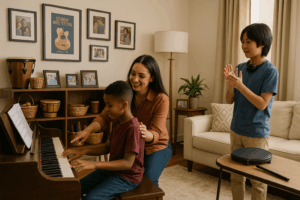Whether you’re instructing piano, voice, or guitar, these reminders for teaching music lessons help you focus on clarity, engagement, and student-centered growth. They’re simple, research-anytime principles that support both effective teaching and joyful learning.
Reminder 1: Offer Clear, Achievable Goals
Lessons should frame clear objectives—“play this phrase smoothly,” or “sing this line in pitch.” Setting achievable short‑term goals keeps lessons focused and gives students a sense of accomplishment. Studies on educational persistence show that defined goals and consistent feedback drive motivation in young learners.
Reminder 2: Encourage Movement & Breaks
Especially with younger students, lessons benefit when rhythm and motion are part of the process. Brief movement breaks—clapping, stepping to a pulse, or responding physically to rhythm—help reset attention. Cognitive research confirms that integrating movement into music instruction enhances retention, engagement, and learning capacity.
Reminder 3: Foster Student Autonomy
Rather than merely instructing, let students make simple choices: “Would you like to repeat that phrase at the same tempo or slower?” or “Try this melody starting from a different beat.” Autonomy‑supportive teaching boosts student resilience and well‑being—not just musical skill. This pedagogy aligns with proven strategies in modern music instruction research.
How These Reminders Promote Growth
| Reminder | Purpose | Outcome |
|---|---|---|
| Clear Goals | Keeps lessons structured and motivating | Stronger student confidence and clarity |
| Movement Breaks | Keeps active attention and rhythm awareness | Better focus, memory, and coordination |
| Student Autonomy | Empowers learner—shifting from following to leading | Greater responsibility and growth mindset |
These strategies pair well with foundational skills introduced in our post on reading chord charts for young musicians, where thoughtful structure leads to fluency and independence.
FAQ – Applying the Reminders in Every Lesson
Q: How often should I check in with student choice or autonomy?
A: Even once or twice per lesson—letting learners choose tempo, piece section, or repetition structure—can build personal investment.
Q: Are movement breaks really necessary in music lessons?
A: Yes—especially for young learners. Research shows breaks help reset attention and reinforce musical memory through movement.
Q: Can young beginners handle goal setting?
A: Definitely. Simplified short‑term goals (“play 3 measures cleanly”) are effective for nearly all ages.
